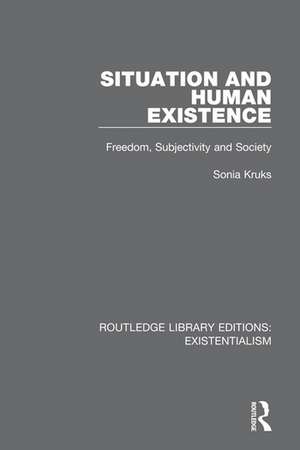Situation and Human Existence: Freedom, Subjectivity and Society: Routledge Library Editions: Existentialism
Autor Sonia Kruksen Limba Engleză Paperback – 15 noi 2020
| Toate formatele și edițiile | Preț | Express |
|---|---|---|
| Paperback (1) | 318.36 lei 43-57 zile | |
| Taylor & Francis – 15 noi 2020 | 318.36 lei 43-57 zile | |
| Hardback (1) | 787.34 lei 43-57 zile | |
| Taylor & Francis – 29 apr 2019 | 787.34 lei 43-57 zile |
Preț: 318.36 lei
Nou
Puncte Express: 478
Preț estimativ în valută:
60.92€ • 63.76$ • 50.70£
60.92€ • 63.76$ • 50.70£
Carte tipărită la comandă
Livrare economică 31 martie-14 aprilie
Preluare comenzi: 021 569.72.76
Specificații
ISBN-13: 9780367110987
ISBN-10: 0367110989
Pagini: 236
Dimensiuni: 156 x 234 x 13 mm
Greutate: 0.34 kg
Ediția:1
Editura: Taylor & Francis
Colecția Routledge
Seria Routledge Library Editions: Existentialism
Locul publicării:Oxford, United Kingdom
ISBN-10: 0367110989
Pagini: 236
Dimensiuni: 156 x 234 x 13 mm
Greutate: 0.34 kg
Ediția:1
Editura: Taylor & Francis
Colecția Routledge
Seria Routledge Library Editions: Existentialism
Locul publicării:Oxford, United Kingdom
Cuprins
1. Marcel: Embodiment and Situation 2. Sartre: Individual Constitution of Situation 3. Beauvoir: the Weight of Situation 4. Merleau-Ponty: Situation and Social World 5. Sartre: Praxis in Situation
Descriere
This book, first published in 1990, traces the development of the concept of situation through the work of Marcel, Sartre, de Beauvoir and Merleau-Ponty. It shows how it illuminates questions of self or subjectivity, embodiment and gender, society and history, and argues that it goes far beyond notions of the ‘death of the subject’.









